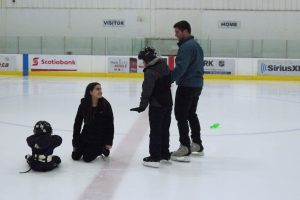For Kinesiology and Health Science’s Dr. Stephanie Bowerman, her Adapted Physical Activity course (KINE 3345) excels in raising students’ understanding of what differently abled individuals need in order to be able to participate in physical activities. But it is the unique partnership she has fostered with her course and SkateABLE, an organization that offers adaptive ice skating lessons for children with physical and developmental disabilities, that allows students to go beyond the classroom and into the community in order to experience course concepts first-hand as volunteer coaches.
During the academic term, students interested in the SkateABLE opportunity are paired with young skaters during skating sessions held at Canlan Ice Sports Arena. Currently, SkateABLE requires volunteer coaches to have a strong background in skating, such as being trained in figure skating, hockey or ringette. In addition to the concepts learned in class, volunteer coaches are given additional training to ensure the physical and emotional safety of the children, including mandatory orientation in HIGH FIVE, Canada’s quality standard for children’s physical activity and sport programs. SkateABLE provides a variety of adaptive equipment that coaches can incorporate into the weekly, one-hour individualized lesson they develop for each skater. “As you get to know the skater you get to see what skill level they’re at, whether they need a walker or whether they can skate by themselves, or whether they need a harness, and what type of activity they need to do,” explained Kinesiology and Health Science student Victor Paltsev.
Sarah Dimas, another Kinesiology and Health Science student, described her first lesson with a young skater, “He couldn’t even step foot on the ice without falling. But each week we kept working on it and, by the end of the [program], he could skate by himself, and I remember being so proud of that.” Dr. Bowerman found coaches’ dedication to their young skaters and their pride in their work with the children to be the most rewarding aspects of this experiential education course. “It is so great to watch the students interact with their skaters. Each week can be totally different. One week it can go great, and the next it may not go as planned. I love watching how students learn to modify their instruction and work out those kinks. At the end of the day, seeing the absolute joy in both the children and students, shows the positive impact that they have on these participants. That is the best part.”
There are only good things to say about the program. Real world experience is the best way to learn and grow as a person, not just a student.
— Victor Paltsev, Kinesiology and Health Science student
Students’ own learning flourished through the partnership with SkateABLE. Sarah Dimas noted, “I got to experience first-hand what we were learning in class so I definitely think it made my essays and my exams a lot easier.” Addressing the impact on students’ learning, Dr. Bowerman said, “It really helps make learning a little more effective, and probably more enjoyable than reading the chapters, because they can immediately link it to an experience.” Weekly reflection pieces help students make meaning of their experiences as they are asked to write about what worked well and what did not in their last on-ice session, and what they planned to do differently the following week. Balancing the learning objectives of the course with the needs of the community partner means ensuring that students fulfill their responsibilities as volunteers, all while achieving their learning goals. In addition to their reflections and their final paper, students are also evaluated by SkateABLE staff on their lesson plans and coaching effectiveness.
I love watching how students learn to modify their instruction and work out those kinks. At the end of the day, seeing the absolute joy in both the children and students, shows the positive impact that they have on these participants. That is the best part.
— Dr. Stephanie Bowerman
Back in the classroom, Dr. Bowerman also incorporates experiential education in other ways. Students who do not volunteer with SkateABLE can work in groups to create a parasport coaching manual complete with lesson plans and assessments. All students also participate in weekly physical activity sessions such as exploring the campus to determine the extent to which it meets the accessibility needs of persons with disabilities or playing Goalball, a sport played by individuals with a visual impairment.
What keeps Dr. Bowerman motivated to continue her experiential education work? “The students get the most learning out of doing something like this. They learn the best and get the most out of my course.” Victor and Sarah agree. Both noted that their SkateABLE experience helped them acquire their current jobs which involve working with children. “I could definitely attribute me getting the job and me having success in this position to the lessons I learned in SkateABLE,” said Victor, who now works in a childcare centre. Asked about advice for any York University student considering participating in SkateABLE, Sarah said, “I definitely say they should do it because there is absolutely nothing to lose. I feel like it expands your knowledge. You could experience first-hand what you are learning [in class].”
For more information, including how to volunteer with SkateABLE, visit skateable.ca.
For more information on Experiential Education in the Faculty of Health visit yorku.ca/health/experiential-education.
By Anda Petro, Experiential Education Coordinator, Faculty of Health
Provided by yFile.

